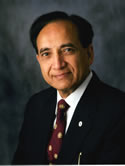| Abstract: |
To evaluate the ability of granulocyte-stimulating factor to decrease mucositis during postoperative radiotherapy for stage II-IV squamous head and neck cancer in a randomized, double-blind, placebo-controlled trial. METHODS: After undergoing complete resection, patients were randomized to receive granulocyte-colony stimulating factor or placebo by daily subcutaneous injection during radiotherapy (63 Gy, 1.8 Gy/day). Patients undergoing prior radiotherapy or chemotherapy were excluded from the study. The primary outcome was the need for percutaneous endoscopic gastrostomy placement. Severity of mucositis was a secondary outcome. RESULTS: Forty-one patients were enrolled (132 planned). The study closed after slow accrual. Patient characteristics were as follows (granulocyte-colony stimulating factor vs placebo): median age, 59 versus 54 years; pT4, 16% versus 23%; pN2/3, 68% versus 59%; stage IV, 79% versus 68%. Forty patients were evaluable for planned outcomes. Patients in the granulocyte-colony stimulating factor arm showed trends toward lower rates of percutaneous endoscopic gastrostomy placement (0% vs 14%, P = 0.2) and severity of mucositis (P = 0.13), and had shorter mean radiotherapy duration (48.4 ± 4.32 days vs 51.6 ± 1.84 days, P = 0.005). Overall survival was significantly greater in the granulocyte-colony stimulating factor arm (hazard ratio, 0.37; P = 0.037). DISCUSSION: Granulocyte-colony stimulating factor during radiotherapy was feasible and led to significantly shorter radiotherapy duration and trends toward less percutaneous endoscopic gastrostomy placement and mucositis. The unanticipated improvement in survival outcomes warrants further hypothesis-driven investigation and validation. Copyright © 2006 Jones and Bartlett Publishers, Inc. |











